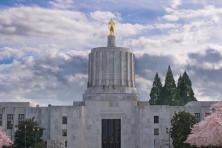The legislators are still considering quite a few significant policies that will curb pollution from buildings and invest in our transportation system more sustainably.
Noted below are key policies we’re tracking as part of our priorities and where we expect them to land before the next major deadlines during session—bills need to move through their fiscal committee by February 7th and the cut off for each chamber to move their policies out is February 15th. Happy to provide more detail or connect you with voices on any of these policies as you consider coverage through the remainder of the WA session.
CLEAN BUILDINGS
Targeted electrification - HB 1767
Quick summary: Public utility customers that rely on gas in their home currently are not eligible for electric appliance incentives, incentives that customers of private utilities do have access to. The Targeted Electrification bill would change that by clarifying that public utilities can create electrification programs, allowing their customers to get incentives to buy efficient heat pumps and other electric appliances, regardless of their current heat source. Through these programs, public utility customers will get more choice and access to affordable, efficient all-electric technologies, and it would level the playing field between customers of private and public utilities. Plus, the utilities can only implement these programs if they are beneficial to the utility’s customers as a whole, not solely the customers receiving the incentives.
- Passed the House Environment & Energy Committee January 20th, full House expected to have a floor vote soon.
Stronger Energy Codes - HB 1770
Quick summary: As Washington cities continue to make progress in setting nation-leading standards for all-electric commercial buildings, local jurisdictions have limited powers to address the residential sector. HB 1770 would provide an optional stronger residential building code that goes beyond the statewide minimum code for local jurisdictions and ensure that all new buildings are ultra-efficient and solar-ready post-2034.
- Passed the House Committee on Local Government on January 21st, full House expected to have a floor vote soon.
CLEAN TRANSPORTATION
Transportation Package
Quick summary: 2022’s efforts on transportation build on the success of 2021’s Clean Fuel Standard and the Climate Commitment Act (CCA). We are advocating for a transportation package that funds multimodal solutions, heavy-duty vehicle electrification, and electrification options for low-income communities. Washington also needs new sources of transportation revenue that are progressive, climate-forward, and flexible in how they can be spent.The Legislature is considering a Road Usage Charge (see notes below).
- Democrats in both chambers seem to be reaching agreement on a package and we anticipate seeing more detail early next week. The package will include federal money, various fees, and $5.2 billion in revenue from CCA. The law stipulates that CCA money may only be spent to reduce carbon emissions in the transportation sector. In large part thanks to this new funding, we will see record investments in transportation electrification, transit, and active mobility options.
- Notably bills related to the transportation funding and investments are not subject to the policy cutoff deadlines as they are necessary to implement the state’s budget.
Road Usage Charge - HB 2026
Quick summary: A Road Usage Charge (RUC) is a great way to move beyond the gas tax to a more stable, progressive way to fund our transportation system. It’s a per-mile fee paid by drivers to account for their use of the transportation system and unlike the gas pump, could be designed to account for people’s income. With the decline of gas tax revenues in our state, it’s critical we look to more stable and consistent sources of revenue to continue to maintain current roads and create a climate-friendly, affordable, and accessible transportation system. Washington is not alone in considering a Road Usage Charge, with many states across the country conducting pilots and studies to consider a policy.
- The House Transportation Committee had a public hearing on February 3rd to establish a RUC that is mandatory for new electric vehicle drivers and allows vehicle owners to opt in over different phases. Those participating in a RUC would not pay the current state electric-vehicle specific registration fees.
OTHER IMPORTANT BILLS WE ARE SUPPORTING
- Energy Intensive Trade Exposed Industries - HB 1682 creates a long-term no-cost allowance allocation trajectory for EITEs. This free allowance allocation does not relieve them of their responsibility to ultimately reduce emissions, but it clarifies how many allowances they will receive for free.
Status: This bill was voted out of the House Environment & Energy Committee on February 1st and is scheduled for a House Appropriations hearing on February 5th. - Improve Clean Energy Siting (EFSEC) - HB 1812 improves siting laws, providing clarity for project proponents around the state’s expectations, certainty and predictability around review timeline. We need to replace our expansive fossil fuel infrastructure—oil refineries, natural gas power plants, and more—with new clean replacements.
Status: The bill passed out of the House Environment & Energy Committee on February 3rd and has been referred to the House Appropriations Committee. - Create more middle housing - HB 1782/SB 5670 would require cities with a population above 20,000 to allow “middle housing” within half a mile of transit stops and duplexes in other residential areas. The lack of housing supply in urban areas has created an affordability crisis; it also is bad for the climate as people are forced to live further from essential services, jobs, transit and more.
Status: The House bill passed out of the Local Government Committee on February 1st and will be heard in the Appropriations Committee on February 5th - Growth Management Act and Climate - HB 1099 would require certain cities and counties that do comprehensive planning to account for reducing climate pollution and vehicle miles traveled and improving climate resiliency under the Growth Management Act.
Status: This bill was voted off the House floor and had its first Senate hearing in the Housing and Local Government Committee on February 1st.


